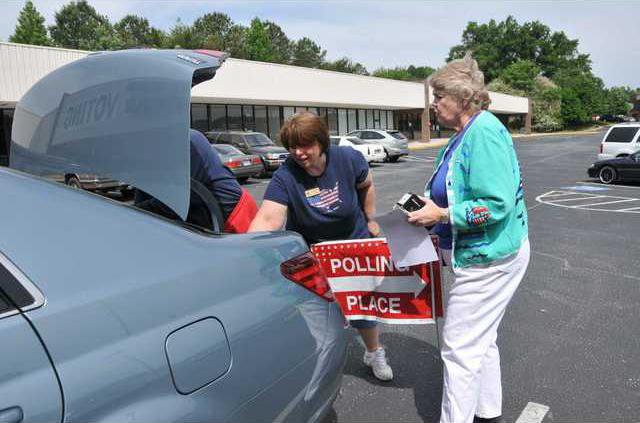Special election
What: Voters in Hall and several other Northeast Georgia counties will select among eight candidates for the 9th District U.S. House seat and among three for the state Senate District 49 seat.
When: Polls are open from 7 a.m. until 7 p.m. today. However, any voter who is waiting in line to vote at closing time will be allowed to vote.
What’s next: If no candidate receives 50 percent of the vote plus one, a runoff will be held June 8 between the top two candidates.
Where to vote: Each voter must vote at the polling place designated for the precinct in which the voter lives. The location of your polling place is located on your precinct card. If you have misplaced your card or do not know where your precinct is located, contact the elections office.
Voter ID: Each voter will complete a voter certificate when entering his or her polling place. The poll worker will request to see one of the required forms of photo ID from the voter, then mark on the voter’s certificate the type of ID displayed.
Registration deadline: Only registered voters may vote in the special election. To vote in the Georgia primary July 20, you must be registered by June 21.
Expecting low voter turnout during a special election is like expecting rain from a cloud shooting bolts of lightning.
But despite expectations of low voter interest, the availability of the polls — and the costs — remain the same for the special election to fill the seats of a U.S. representative and a state senator.
Elections officials in each county across the U.S. House 9th District are shelling out tens of thousands of dollars to open the polls today — an election most say they did not plan for financially.
On the ballot to replace the 9th District’s former representative are eight candidates, six of them Republicans — Bert Loftman, Bill Stephens, Chris Cates, Lee Hawkins, Steve Tarvin and Tom Graves — along with a conservative independent, Eugene Moon, and a Democrat, Mike Freeman.
Nathan Deal resigned in March as the district’s representative to focus on his campaign for governor, he said.
Hawkins, of Gainesville, resigned from the state Senate to qualify for the special election to take Deal’s place.
Three men are on today’s ballot to complete Hawkins’ term — Libertarian Brandon Givens and Republicans Butch Miller and Jimmy Norman.
The winners of both seats will serve until the end of the year, and likely will have a leg up in the upcoming party primaries for November’s general election to a full term.
The election’s estimated cost for all 15 counties of the 9th District is upward of $268,000, according to estimates given to The Times Monday.
And already, it seems, the cost per voter will be high.
Early and advance voting ended last week with little interest, elections officials said. In the month Hall County residents were able to vote early, 1,898 voters took advantage of the opportunity, Interim Elections Superintendant Charlotte Sosebee said.
The number is only slightly higher than turnout for early voting in the county’s last special election. In March 2009, 1,814 Hall County residents voted ahead of the date of the election to determine whether the county would have another round of the special purpose local option sales tax, Sosebee said.
“It’s a little over (the last election). It’s just a little bit,” ” Sosebee said with a laugh “... Every one counts.”
In Hall County, it costs $45,000 to open 39 precincts. In Forsyth County, where there are about 20,000 more registered voters than in Hall, the cost will range between $40,000 and $50,000, said Barbara Luth, supervisor of voter registrations and elections.
Larry Sampson, chief registrar in Murray County in the center of the 9th district and toward the northwest portion of the state, said turnout, so far, has been “very, very light.”
And he isn’t expecting any improvement today. The cost of keeping seven precincts open is estimated at $7,000.
And for one of the district’s smaller counties, funding a special election in a tough budget year, whether anyone shows up or not, is “like trying to get blood from a turnip,” Sampson said.
While most counties reported early voting turnout that one even called “terrible,” Garrison Baker, probate judge and elections superintendent for White County said he was surprised that 208 people voted during the county’s week of early voting.
The number was about one-third more than what Baker had expected, and now he’s predicting between 15 percent and 18 percent of White County’s registered voters will vote by the end of today. Usually, about 12 percent of the county’s voting public shows up in special elections, Baker said.
“It indicates there’s a little more interest from the voting community,” Baker said.
Baker attributes the interest to the sheer number of candidates on the ballot for the vacant U.S. House seat.
But eight candidates on the ballot also means most elections officials in the district are not expecting one candidate to receive a majority of the votes — an outcome that will necessitate a runoff election and double the costs.
“It’s very, very unfortunate that this election had to be held from a money standpoint,” Sampson said. “It’s tough, it really is.”

